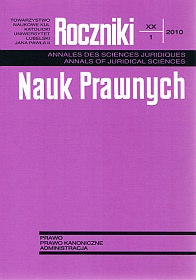The Legal Status of the Metropolitan Sui Iuris Church
Abstract
The Eastern Catholic Church as a hierarchical structure demonstrates the existence of the sui iuris metropoly. The very notion of a sui iuris metropolitan, according to the current Eastern Code of 1990, points to a community of Christians subject to a hierarchy. This community was explicitly or tacitly acknowledged at some point by the highest authorities of the Church (Canon 27). Therefore, a sui iuris metropoly should be distinguished from another metropolitan institution within the Latin or Eastern Church. A sui iuris metropoly is not a church province (ecclesiasticae provinciae), because this term is reserved for a metropoly in a patriarchal church or a major archbishop’s church, but a structure whose institutional autonomy is guaranteed by its founding act. A metropolitan sui iuris church is then a legal person established by the power of law and the metropolitan is its legal representative in all legal matters. The sui iuris metropolitan is appointed by the Bishop of Rome, who is supported by such bodies as the Council of Hierarchs and Metropolitan Assembly. At present, there are three such churches: Ethiopian, Ruthenian and Slovakian.
Copyright (c) 2010 Roczniki Nauk Prawnych

This work is licensed under a Creative Commons Attribution-NonCommercial-NoDerivatives 4.0 International License.


